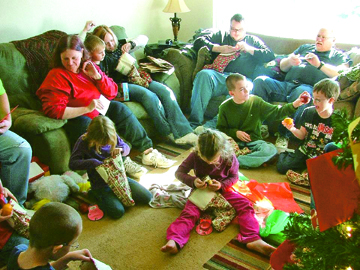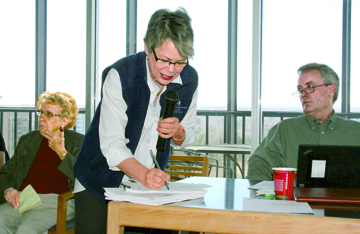Part II Of City’s Attack On Its Own Neighborhoods?
by Glen Richardson
 Denver has been known for its highly livable neighborhoods which contain more single family homes than almost any comparable city in the United States. But single family homes have been deemed by some progressive urbanists as a villain in the fight against urban sprawl and the cause of much hated suburbia.
Denver has been known for its highly livable neighborhoods which contain more single family homes than almost any comparable city in the United States. But single family homes have been deemed by some progressive urbanists as a villain in the fight against urban sprawl and the cause of much hated suburbia.
There has been a call for ever more density in Denver by individuals such as Denver Planning Executive Director Brad Buchanan (who lives on a 1,500 acre ranch outside of Denver) and former councilman and failed auditor candidate Chris Nevitt. Nevitt demanded in a speech explaining why he was voting for high density rezoning of Mount Gilead Church property that every neighborhood in Denver must do its share to absorb high density. His views were condemned by neighborhood groups and even by The Denver Post in a scathing editorial. But his views are believed to be supported by a significant majority on the Denver City Council.
 But building high-rise apartments on former park and church land has been deemed by Nevitt and others as not sufficient to destroy the single family neighborhood character of neighborhoods like Washington Park, Hilltop, Crestmoor, Congress Park and Cherry Creek North. Thus some members of the Denver City Council have turned to doing away with concept of “single family” homes at all. By pushing the idea of “short-term rentals” where every former single family home can be turned into a mini apartment house, high density can also be obtained.
But building high-rise apartments on former park and church land has been deemed by Nevitt and others as not sufficient to destroy the single family neighborhood character of neighborhoods like Washington Park, Hilltop, Crestmoor, Congress Park and Cherry Creek North. Thus some members of the Denver City Council have turned to doing away with concept of “single family” homes at all. By pushing the idea of “short-term rentals” where every former single family home can be turned into a mini apartment house, high density can also be obtained.
What were once sleepy streets throughout the city are suddenly waking up to the fact that the Valley’s homes-as-lodging trend is growing fast albeit not without controversy.
Neighborhood advocates say the trend is creating parking, trash and noise issues plus in a few instances disruptive or illegal activities. Furthermore, they argue these rentals detract from the peaceful and quiet enjoyment of neighborhood homes and property.
Despite currently being illegal (City’s Zoning Code requires month-to-month or longer tenancy), Denver’s short-term rental market is among the hottest in the nation. Airbnb alone has 1,000 Denver properties listed, according to Denver City Councilwoman Mary Beth Susman, the Council’s task-force chair. In fact Zillow — the online real estate database company — ranks Denver fifth among the country’s 50 top markets. Zillow also puts Denver as the eighth most expensive rental market in the U.S. and the most expensive between the two coasts.
Tech, Money Driven
Technology startups have emerged to encourage home rentals and host short-term retail platforms such as Airbnb, VRB O, HomeAway and others. These new and suddenly proliferating hospitality services are helping propel local property owners into the home rental business by providing hotel-type services from simple key exchanges to full rental management. A startup — known as the Key Exchange — gives homeowners the opportunity to store their property keys at a neighborhood restaurant and be notified when they are picked up or dropped off by renters.
O, HomeAway and others. These new and suddenly proliferating hospitality services are helping propel local property owners into the home rental business by providing hotel-type services from simple key exchanges to full rental management. A startup — known as the Key Exchange — gives homeowners the opportunity to store their property keys at a neighborhood restaurant and be notified when they are picked up or dropped off by renters.
Pillow — a full-service online short-term rental service — handles listings and price optimization, bookings, guest screening and communications, key exchange plus laundry. Currently, it works with Airbnb, VRBO and HomeAway. Pillow recently raised $2.65 million and is planning to expand its full service into 10 U.S. cities.
A key reason short-term rentals are becoming common is because these renters are paying top dollar. Furthermore, more money can often be made by renting homes to tourists for a few days at a time compared to renting to local families on a monthly or yearly basis. Additionally, a new type of property buyer is entering the local housing market exploiting the sudden popularity of short-term rentals with an eye on quick profits. A Florida firm, for example, recently purchased a Capitol Hill building and is renting all of the units on a short-term basis, upsetting local residents. Finally, a growing number of tourists are seeking vacation destinations that offer something more than simply a hotel room.
Issues regarding short-term rentals are coming to a head in Valley neighborhoods plus the Denver City Council is looking at length at the issues. What they are finding out is that there are a lot of problems. Recognizing that vacation rentals are not a passing trend, nearly every Valley neighborhood is grappling with regulations to help mitigate their impact.
Neighborhood organization INC — the Inter-Neighborhood Cooperation — has passed a resolution urging both the Denver City Council and Mayor Michael Hancock to enforce the provisions of the Denver Zoning Code prohibiting short-term rentals. The organization is also calling for a range of regulations that would include taxation, licensing and limitations based on density and location.
When the City Council’s Shared Economy Task Force began studying short-term rentals, resident George Mayl asked, “Why on such an important citywide topic have the meetings by Councilwoman Susman not been televised?” This April her Task Force became part of the Council’s Neighborhood & Planning Committee and is now televised on the fourth Wednesday of each month. Mayl told the Chronicle, “It is time for the City to protect its residential neighborhoods from commercial encroachment.” He observes that more and more cease and desist orders are being brought to Board of Adjustment hearings as residents learn they do not have to put up with motel type activities in their neighborhoods.
Close To Home
Short-term rentals drew special interest from attendees at the West Wash Park Neighborhood Assn. (WWPNA) meeting on April 22. The attention was due to the fact a neighborhood home owned by a Florida investor was listing the home for rent as cannabis-friendly. The owner withdrew her appeal of a cease and desist order after her properties in Congress Park were closed down.
“The members at this meeting were quite concerned that these short-term rentals can be disruptive, the lodging taxes aren’t paid, they remove housing — particularly affordable housing — from an already squeezed market and violate the zoning code and commercialize residential zoning,” resident Charlotte Winzenburg tells the Chronicle.
She adds that when the Denver Zoning Code was being re-written, “WWPNA was an active participant in all the public meetings and had an ad hoc committee that spent many hours over many months studying the proposed code, commenting on proposals and lobbying for the zoning that our neighbors told us they wanted.”
Neighborhood Risks
The INC Zoning & Planning Committee known as ZAP has analyzed the potential impact to Denver’s neighborhoods and identified significant risks. “Our assessment includes the effect it will have on affordable housing, key enforcement agencies and Denver governmental departments. The Committee has grave concerns about the real possibilities of unforeseen and unintended consequences of permitting short-term rentals in residential neighborhoods. This is not a problem for another day. The decisions we make today will determine the future of Denver’s neighborhoods,” says the ZAP Committee co-chaired by Margie Valdez and Greg Kerwin.
Among the issues Denver City Council must address is the argument by proponents that private property rights must be protected. Advocates also contend regulations could harm the economy. Furthermore, if regulations are adopted, how many short-term rentals should be allowed in a neighborhood and how would the number be determined? Should registration and/or licensing be required in order to provide notice to neighborhoods (needs and desires hearings)?
The City must also consider what new City Ordinances should be required for short-term rentals. Possibilities include public nuisance, noise limits, property maintenance standards and nighttime curfews. Other considerations include parking restrictions, inspections, and emergency access. Finally, will new trespassing and disturbing the peace regulations be necessary?
What’s At Stake?
INC estimates that any change to regulations that would allow short-term rentals could result in 10,000 or even 20,000 or more added neighborhood rentals to Denver. “How many of these will be in violation of what change might be made to the zoning code?” the organization asks. Another question: “How will Denver’s Neighborhood Inspection Services possibly be able to monitor a greater number than they currently cannot monitor, particularly when other cities have been unable to do so?”
Lenders and insurers of properties must be included as stakeholders to ensure loan and insurance documents are in compliance, INC believes. Homeowners insurance, they note, does not include short-term rental damages. They also worry that a lack of premise health and safety inspection would endanger visitors and tourists.
Turning neighborhoods into areas for motels and hotels destroys the integrity of the neighborhood and, more importantly, the expectations of the property owners who purchased the property with the intention of a neighborhood remaining a residential neighborhood, INC says. Wrapping up, the citywide advocate representing Denver neighborhood association members concludes: “This is a city we call home. Is City Council propounding legislation that benefits a few residents and shared economy entrepreneurs-opportunists at the expense to the quality of life of most Denver residents? We hope not.”


